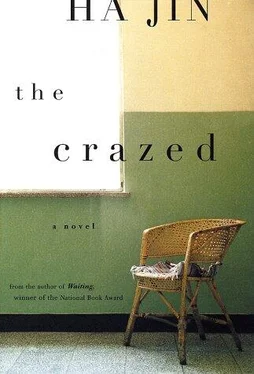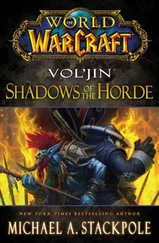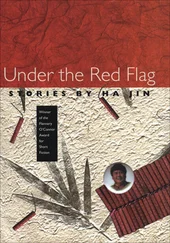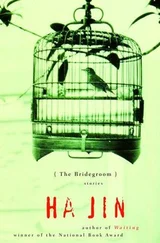“I should be leaving,” she said to both me and Mr. Yang. Then she turned to me. “Please help him with the watermelon when he wants it.”
“Sure, trust me, I won’t partake of any of it.” I tried hard to be funny.
“You can have a bite if you want.” She gave a smile, the same shy, sweet smile. “Good-bye, Mr. Yang.” She waved her small hand at him.
“See you later, Weiya,” he muttered. Evidently her visit had calmed him down; he looked so gentle now.
Having taken leave of me, she made toward the door. Her lustrous hair, loosely tied into a ponytail, swayed against her pea-green sweater and almost reached her curvy waist. Her slim legs and hips were swinging a little in her long jeans, whose cuffs almost touched the floor, covering her red vinyl sandals. When she had disappeared beyond the door, I closed my eyes and couldn’t help but think of the words our teacher had used to describe her body.
“What have you been doing?” Mr. Yang interrupted my thoughts.
“I–I’ve been preparing for the exams,” I answered him, though I hadn’t opened a textbook lately.
“What exams?” he asked.
“For the Ph.D. program.”
“You should learn how to grow millet instead.”
“Why?”
“The more you know, the crazier you’ll go, like me. Intellect makes life insufferable. It’s better to be an ordinary man working honestly with your hands.”
I kept quiet, afraid he might throw another fit. Soon he began hiccuping spasmodically like a sick rooster unable to crow.
Weiya’s visit puzzled me in an odd way. Usually a mistress wouldn’t bring a watermelon to her lover’s sickbed and feed him without any trace of unease, but Weiya had done that as if it were a natural thing for her to do. Her manner revealed a good deal of innocence. What really motivated her? In some way she acted like a child, as if she were performing a filial duty. Yes, “filial” might be the right word to describe her manner. She behaved like a daughter dutifully caring for her sick parent.
It dawned on me that she must have seen a father figure in our teacher to compensate for the father she had lost long ago. From Mr. Yang she might have sought not only intimacy and love but also consolation and assurance. Whether she herself had been aware of the true nature of their affair, I couldn’t tell, but I believed my guess was close to the truth. This also explained why no matter how friendly we were, she had never been interested in me as a man and I had always remained a big boy in her eyes. She couldn’t possibly be attracted to a man younger than herself.
If only I were ten years older.
At lunch Little Owl was delivering a speech again. He always wore his blue jacket and pants whose legs had lost their original color, whitish and stained with grease in places. A stout fountain pen was stuck in his breast pocket, just above a large blotch of dried ink and a crust of snot. He had never worn underclothes or socks, not even in freezing weather, when he would just put on a quilted, felt-collared overcoat. Winter and summer alike, his feet were sheathed in the same pair of suede shoes, which were often broken but always patched up for him by someone. Today he was babbling about artillery and tanks, every now and again shouting, “Bang-bang-bang!”
“Comrades, more than a dozen Russian tanks are coming across the frozen river,” he went on. “They’re crawling toward our position like giant turtles. Bang-bang-bang, our cannons fire at them, but they won’t stop. They are all shaped like an egg, so our artillery shells cannot damage them — even our armor-piercing rounds cannot penetrate them. One by one the shots slip off their turrets as they’re coming closer and closer. But our brave soldiers are not intimidated by the Russian Big Noses. They hide in the trenches covered by snow, waiting for the steel turtles. Not until the tanks get within twenty feet do our men fire their bazookas, bang-bang-bang. Launched so close, every shell finishes off a damn tank. . ”
What he was describing was a battle between Chinese and Russian troops on the Wusuli River twenty years before. Although most of the students in the dining hall knew little about the battle, they paid no attention to the madman’s ranting.
When I was a little boy, I had dreamed of becoming an officer in the People’s Liberation Army someday, though my father’s problematic political status would have disqualified me for army service; so I had often browsed through some old magazines that carried reports and pictures of battles. The tanks Little Owl referred to were T-62s, whose oval, streamlined bodies were almost impervious to the Chinese cannons. But some of them were destroyed by bazooka shells launched from an extremely short distance. One soldier, who later became a national hero, fired his bazooka within twenty feet of a tank. The explosion not only shattered the track shoe of the T-62 but also knocked him out. Although he was saved and hospitalized for half a year, he lost his hearing for good. I remembered reading in an article that the Russians, fearing that their most advanced tanks might fall into the hands of the Chinese, had shelled the ice around those disabled tanks to sink them into the river, but under cover of darkness the Chinese troops and militia hauled one of the tanks ashore and shipped it inland. After taking it apart and studying the technology, the Chinese made our own model of the tank, which I heard had less armor but a similar cannon.
Tired of Little Owl’s old story, I picked up my lunch and went out, despite a wall of heat already rising outside. Somehow he seemed to have an eye on me these days. As I was passing him, he brandished his tiny fist, shouting, “Down, down with this Russian Chauvinist!” He even shoved my shoulder from behind. My radish soup spilled, and a slice of pork the size of a rose petal landed on the dirt floor. A few girls in the Foreign Languages Department giggled. I turned around, about to curse him, but his glowing eyes invoked so much pity in me that I went out without a word. Meanwhile he kept yelling, “Put down your arms, we’ll spare you!”
“Knock it off!” shouted my roommate Mantao. That made the madman turn on him.
I squatted down with my back to a brick wall, on which remained Chairman Mao’s instruction in gigantic characters: BE UNITED, ALERT, EARNEST, LIVELY. I was eating alone and unhurriedly, but in no time Little Owl began to bother me again, calling me a running dog of the new Tsar. I pretended I had heard nothing. Now and then he fired a shot in my direction. I decided to eat at a food stand or a noodle joint for a few days, so that he might forget me. There was no way to call a truce with him. Full of belligerence, he was always looking for an enemy, ready to hurl invective.
Dr. Wu had instructed us to let Mr. Yang sit at least a few times a day as a kind of exercise. During my shift, besides sitting him up, I always made him lie on his stomach for half an hour and rubbed him with a warm towel. Recently he often complained of lumbago, probably because he had remained in bed too long; I tried to massage his lower back every afternoon, which seemed to help ease his pain. In the morning, sunlight often fell in through the window, so I told Banping to make Mr. Yang sun himself a little whenever it was possible. I believed sunlight would do him good.
Early Friday afternoon a group of undergraduates came to visit him. They brought along a box of almond cookies, a small net bag of apricots, and a bunch of golden daisies that they must have picked on the slope east of our school. With the youngsters around him, Mr. Yang changed altogether. He was no longer a crazed patient, but instead returned to his former self — a powerful, wise, fatherly teacher. It was as if there were a switch in his head which he could flip on and off to alternate his personalities. The students put the fruit and the cookies on the cabinet and the flowers into a glass jar on the windowsill.
Читать дальше

![Lao Zi - Dao De Jing [Tao Te Ching] (english)](/books/3890/lao-zi-dao-de-jing-tao-te-ching-english-thumb.webp)
![Lao Zi - Dao De Jing [Tao Te Ching] (chinese)](/books/3891/lao-zi-dao-de-jing-tao-te-ching-chinese-thumb.webp)
![Lao Zi - Dao De Jing [Tao Te Ching] (espanol)](/books/3892/lao-zi-dao-de-jing-tao-te-ching-espanol-thumb.webp)







